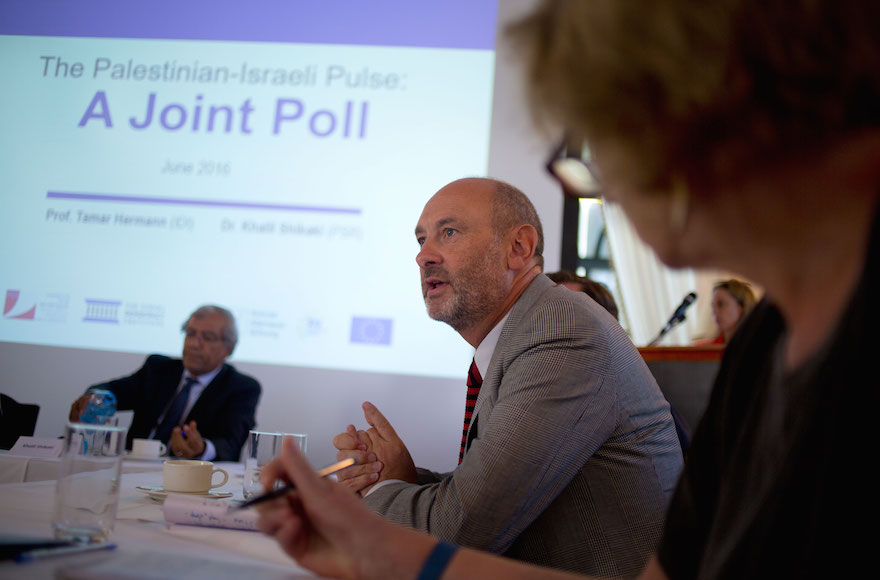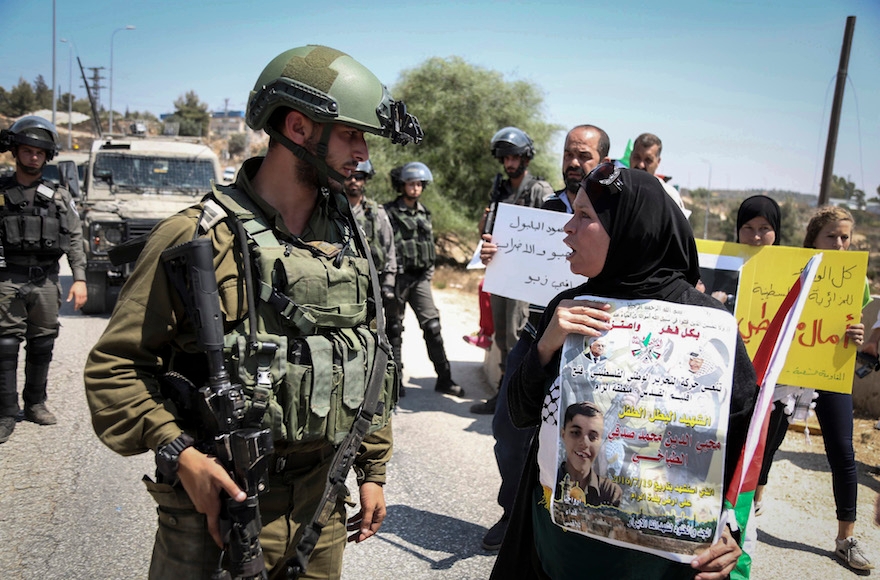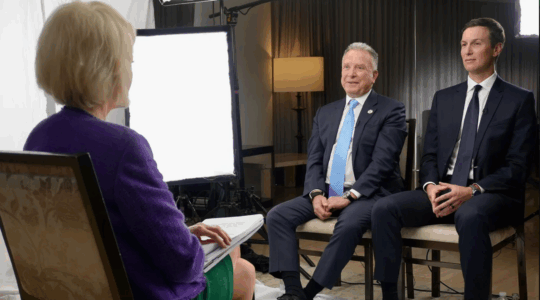JERUSALEM (JTA) — Most Israelis and Palestinians oppose the kind of peace deal that has been under negotiation in the past, a new poll found.
Nearly 60 percent of both Israeli Jews and Palestinians said they were against the permanent status agreement they were presented based on previous Israeli-Palestinian peace talks, according to the joint poll by leading Israeli and Palestinian think tanks. But about a quarter of those opposed would reconsider if the deal were part of a broader regional peace based on the Arab Peace Initiative.
“It is very clear that a majority of Israelis and Palestinians at this point have responded with opposition to the package,” Khalil Shikaki, the director of the Palestinian Center for Policy and Survey Research, told JTA. “However, we were able to easily change their minds simply by adding the Arab peace component. We got close to 55 percent support for the package when it is an Arab-Israeli peace rather than just a Palestinian-Israeli peace.”
The Palestinian think tank and the Israel Democracy Institute, a leading research center in Jerusalem, surveyed 1,184 Israelis and 1,270 Palestinians, revealing little consensus on the parameters of peace and mistrust and fear of the other on both sides — along with some hope for flexibility.
Some 59 percent of Israelis and 51 percent of Palestinians support a two-state solution to the conflict, the poll found. But a majority of Israelis (57 percent) and nearly half of Palestinians (47 percent) think a majority of their people opposes two states.
“This has far-reaching implications because if you feel you are part of the minority, you will be less outspoken and proactive and confident,” Tamar Hermann, the academic director of the Israel Democracy Institute’s Guttman Center for Public Opinion and Policy Research, told JTA. “If you belong to the majority but you believe you are part of the minority, you will act like the minority. It’s a spiral of silence.”
One in five Israeli Jews and one in three Palestinians wants a one-state solution, meaning a single state for Israelis and Palestinians rather than an independent Palestinian state alongside Israel. Last year, 51 percent of both Israelis and Palestinians supported a two-state solution, according to a similar survey conducted annually by the Palestinian center with the Truman Institute for the Advancement of Peace at the Hebrew University starting in 2000.
The peace deal offered in the latest poll provides for a demilitarized Palestinian state, reciprocal national recognition, Israeli withdrawal to its pre-1967 borders with territorial swaps, the reunification of 100,000 Palestinians with families in Israel, the division of Jerusalem and its holy sites, and the end of conflict and claims. A multinational force would be set up in the Palestinian state, and Israel would maintain two early warning stations in the West Bank for 15 years.
While 55 percent of Israeli Jews and 59 percent of Palestinians oppose the deal, a minority of Israeli Jews and Palestinians (39 percent) back it, as do 90 percent of Israeli Arabs. Twenty-six percent of those Israeli Jews would be willing to change their mind if the Arab states agreed to peace based on the Arab Peace Initiative, and 25 percent of those Palestinians would do the same if Israel accepted the initiative, which was first proposed in 2002.
There is little trust between Israelis and Palestinians, the poll revealed. The vast majority of Palestinians (89 percent) feel Israeli Jews are untrustworthy, and most Israeli Jews (68 percent) feel that way about Palestinians. A minority of both Israelis and Palestinians (43 percent) believe the other side wants peace, and large majorities on both sides (77 percent of Israelis and 73 percent of Palestinians) think the chance of an independent Palestinian state being established in the next five years is “very low.”
Half of Israeli Jews, 61 percent of Israeli Arabs and 70 percent of Palestinians agree: “Nothing can be done that’s good for both sides; whatever is good for one side is bad for the other side.”

Khalil Shikaki speaking at the conference in Jerusalem announcing the findings of the joint poll, Aug. 22, 2015. (Courtesy of IDI)
Sixty-five percent of Israelis say they fear Palestinians, while 54 percent of Palestinians say they do not fear Israeli Jews, according to the poll. Israelis and Palestinians tend to perceive each other’s national motives to be much more extreme than they do their own side’s.
Most Israelis (64 percent) and a large minority (43 percent) of Palestinians support mutual recognition of Israeli and Palestinian national identities. Prime Minister Benjamin Netanyahu’s insistence on such was an obstacle in the last round of American-led Israeli-Palestinian peace talks in 2013-14.
Among both Israelis and Palestinians, religious observance and political leaning are predictive of backing for the proposed peace deal, the poll found. Secular and left-wing Israeli Jews are more likely to be supportive, while more religious and right-wing Israeli Jews are less likely to back the plan. Just 16 percent of Israeli settlers in the West Bank are on board, compared to 40 percent of non-settlers.
Similarly, less-religious Palestinians are more supportive of the deal than are the more-religious, and there is a large difference in support between Fatah and Hamas voters — 57 percent versus 25 percent. Fatah is the political party of Palestinian Authority President Mahmoud Abbas. Hamas is the Islamist terrorist group that governs the Gaza Strip.
Who should broker peace? A large plurality of Palestinians (44 percent) prefer multilateral negotiations, while a similar number of Israeli Jews (40 percent) prefer bilateral talks between the Israeli government and the Palestinians. Just 18 percent on both sides favor a unilateral approach.
When asked to choose among four potential mediators of talks, an Arab forum of Saudi Arabia, Egypt and Jordan was the most popular among both Israeli Jews and Palestinians (26 percent and 22 percent, respectively). All the other proposed options — the United States, the European Union and the United Nations — are acceptable to one side but unacceptable to the other.
“The leadership of an Arab forum is of course interpreted differently by the two sides,” Hermann said. “For Israelis, it means they are jumping over the heads of the Palestinians and negotiating their future with others. [Israeli Defense Minister Avigdor] Liberman is very much in favor of this arrangement. From the Palestinian point of view, as they feel weak in a bilateral framework, they prefer to have a multilateral framework with their big brothers.”
Egypt and France are both pushing initiatives to revive Israel-Palestinian peace talks. Palestinian leaders demand that Israel freeze settlement construction and agree to negotiate based on its pre-1967 borders as preconditions for talks.
Most Palestinians (62 percent) blame the Israelis for the failure of previous rounds of negotiations, while most Israeli Jews (52 percent) blame the Palestinians. U.S. special envoy Martin Indyk, who oversaw the latest failed attempt, reportedly assigned most of the blame to Israel, while the State Department said no one is to blame but “both sides did things that were incredibly unhelpful.”
READ:
Netanyahu keeps calling for talks with Abbas. Is he serious?
Why Israeli-Palestinian peace negotiations were like bitter divorce proceedings
JTA has documented Jewish history in real-time for over a century. Keep our journalism strong by joining us in supporting independent, award-winning reporting.






